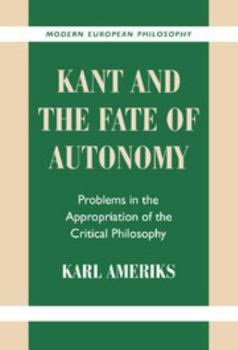Kant and the Fate of Autonomy: Problems in the Appropriation of the Critical Philosophy
(Part of the Modern European Philosophy Series)
Select Format
Select Condition 
Book Overview
It has been argued that Kant's all-consuming efforts to place autonomy at the center of philosophy has had, in the long-run, the unintended effect of leading to the widespread discrediting of philosophy and of undermining the notion of autonomy itself. The result of this Copernican revolution has seemed to many commentators the de-centering, if not the self-destruction, of the autonomous self. Ameriks challenges the presumptions that dominate popular approaches to the concept of freedom, and to the interpretation of the relation among the Enlightenment, Kant and post-Kantian thought.
Format:Hardcover
Language:English
ISBN:0521781019
ISBN13:9780521781015
Release Date:June 2000
Publisher:Cambridge University Press
Length:366 Pages
Weight:1.35 lbs.
Dimensions:0.9" x 6.1" x 9.1"
Customer Reviews
1 rating
The fate of Kant's critical system
Published by Thriftbooks.com User , 19 years ago
The appearance of Kant's great critiques initiated a revolution in philosophy, and yet for many he is beyond reach, as if contained and reformed by his successors, and their transformations of his starting point. Beginning with Rheinhold and Fichte this process began, and within Kant's own lifetime the core of his system was being overshadowed. Their contributions, ending with Hegel, are, of course, of great interest, and yet a subtle process of taking Kant as superceded has been their legacy, and it is quite misleading. This has tremendous ramifications even in our own time, for we can see that even post-Deweyan pragmatism with its 'naturalized hegelianism' is built on this secondary strain (to say nothing of this in Marxism). Ameriks thus produces a very interesting review of Kant's 'modest system' and its remorphed descendants wherein the resurrected phoenix of metaphysical absolutes produces its spectacles. Kant is accused of foundationalism now, and yet his 'modest system' in Ameriks' phrase is actually the original of most of this later attacks.





